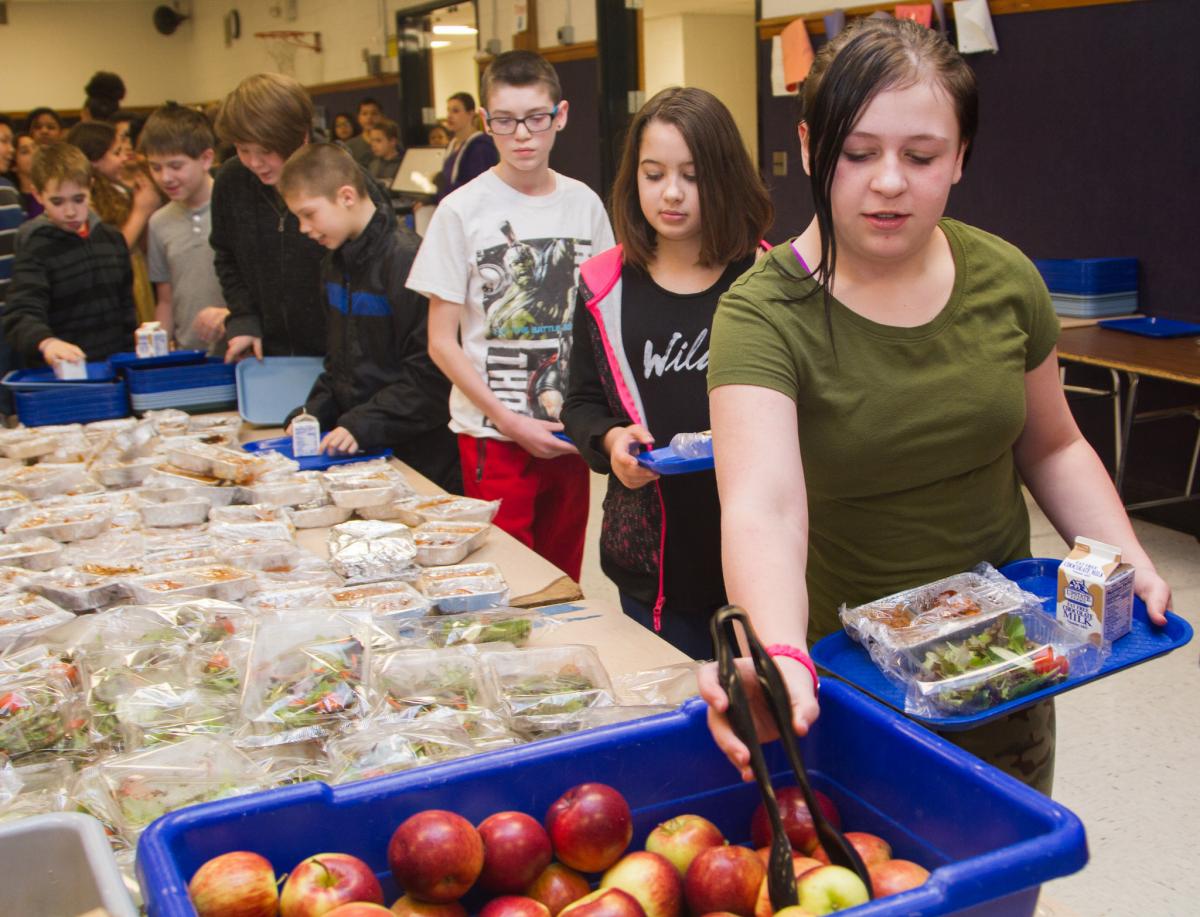“I heard that eating salad helps you live longer.”
That’s what one fourth grader proclaimed at last month’s meeting between Watertown elementary school students, school staff members and two local farmers. Wiggly second and fourth graders munched on fresh salad greens and crunchy apples while learning from farmers about how the food on their plate was grown and why it’s important to eat nutrient-rich fruits and vegetables.
Kevin Richardson of Agbotic, in Sackets Harbor, and Jay Canzonier of North Branch Farms in Henderson came to Starbuck Elementary School to talk about local food production and encourage children to adopt healthy eating habits.
“The kids like this food,” said Watertown Food Service Director Colleen Rielly. “They just need to be exposed to it.”
But it’s not always easy to get tasty, farm-fresh food into school cafeterias. Cost, preparation and other factors can make the move away from processed food challenging for many school districts.
In his “No Student Goes Hungry” initiative, Governor Andrew Cuomo has proposed raising the state reimbursement for local food to $0.25 per meal for schools that spend 30% of their food budget on these foods. Since the current reimbursement rate of $0.06 per meal has not changed in over 40 years, when minimum wage was $2.65 an hour, this could be a real boon to farmers in the North Country.

Photo: Over 600 middle school students at H.T. Wiley School in Watertown are offered locally grown salad greens as part of their school lunch.
The Governor’s approach to improving student health and creating sustainable new markets for farmers is already working in Jefferson and St. Lawrence counties, where a pilot version of the same program has been in place since 2016. Through the Drive for 25 program, an initiative spearheaded by Assemblywoman Addie Jenne (D-Theresa) and implemented by ANCA, increased funding has allowed participating schools to expand usage of local food products, jumpstarting local purchasing in those counties.
In the two years since Drive for 25 started, Jenne has secured $600,000 for the effort, which has benefited 19 school districts, 24,000 children and 15 local farms that are now selling directly to schools. Over 150,000 pounds of 47 different local food products have been served at breakfast and lunch in participating schools.
In the Watertown City School District, Reilly and Superintendent Patti Labarr have embraced the Drive for 25 Farm to School program and see firsthand how it’s benefiting students. Local food is now served in eight schools throughout the district. Since September 2017, H.T. Wiley Intermediate School started offering locally produced to over 600 middle school students at lunchtime.


Photo: Elementary-age children can be the most receptive and open-minded eaters when they are offered fresh, tasty fruits and vegetables. “They like this food,” said Watertown Food Service Director Colleen Rielly. “They just need to be exposed to it.”
The North Country is ready to move if the reimbursement increase is approved. ANCA’s Farm to School Specialist and local farmer, Renee Smith is working with partners like Cornell Cooperative Extension to facilitate connections between schools and farmers and streamline the local food procurement process.
A refined farm to school model can be adapted to meet the needs of other districts in the North Country region and throughout state. The systems developed with schools can also be more broadly implemented in institutions like hospitals, restaurants, supermarkets, colleges and universities—further strengthening the region’s food system.
The Governor’s proposed expansion to a statewide program would create the stability and critical mass necessary to make the program work on a systems development level. With Drive for 25 funding in place, farmers are able to test out markets and consider significant investments of time and money in their businesses.
Farming is all about cycles and interconnection. Students’ connection to food, farming and good nutrition are all benefits afforded by the Drive for 25 program and other farm to school programs. These programs provide communities with an opportunity to improve childhood nutrition, support local businesses and prepare our children for viable careers in agriculture.
The time is right for our state leaders and economic development organizations to catalyze and support the growing farm to school movement which directly benefits our region’s farms, families, communities and local economies.
For more information about the budget proposal or to get involved, check out the following resources:
Governor Cuomo’s 15th Proposal, No Student Goes Hungry
New Food for New York Kids Call to Action
American Farmland Trust Press Release
American Farmland Trust Call to Action
